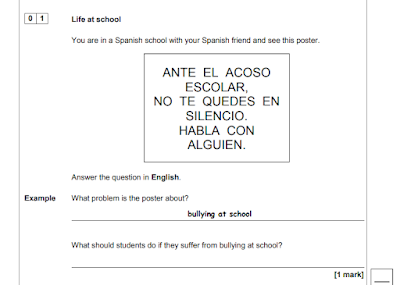NB This post is looking at the importance of high frequency vocab in the OLD GCSE.
My Year 10 Spanish class have just done a unit on School. In their speaking, they can talk about what lessons they like and why, clubs, trips, rules, facilities and relationships with other pupils. All built around expanding their repertoire of giving and justifying opinions, and developing little anecdotes in a combination of tenses. So I set about finding some past paper exam questions on the "topic" of school.
Here's one I found straight away. It's 2019 Reading. On the topic of school life.
Except it's not.
Pupils will know "acoso" and they know "habla". So if there was a comprehension question on the topic, for example, "Explain what advice this poster is giving", then they could say something like, If you are being bullied, make sure you talk about it. With the credit given, quite reasonably, for knowing the words they have learned, bullying and talk and understanding the advice.
But as we have seen, the current GCSE exam papers aren't about comprehension at all. Recognising the word bullying which they covered in the topic, isn't being tested. It is given to you in the question. The word talk, we see from the markscheme, isn't enough for a mark. The word that is required for the answer, the one word that this whole question is testing, the sole object of this page of photocopying, this invented poster with its subjunctive-negative-imperative and its ante-not-antes, representing the topic of Life at School... the one word it is testing is alguien. To get the mark you have to say, "Talk to somebody."
Somebody. Not a "topic" word at all.
And the search goes on, for a nice past paper question to use for Year 10 relevant to the Topic of School. I didn't find any. I went back to the old GCSE and found some that looked hopeful. Even then they mixed School and Healthy Eating and Technology. But the questions all relied on words like sin, tampoco, demasiado. Without, neither, too.
This was backed up by NCELP on twitter @ncelpmfl in a post showing that the current GCSE Listening and Reading exams contain higher levels of high frequency vocabulary than topic vocabulary. And @mfltransform also tweeted findings showing that at Foundation Tier, the current GCSE specificaton doesn't have much less "high frequency" vocabulary than the NCELP lists. But that the NCELP lists do have substantially less "topic vocabulary".
What does this mean?
For me, the problem with the current GCSE is that there is a dichotomy between the Speaking and Writing exams, and the Listening and Reading exams. The words I am teaching my pupils to talk and write about school, are not going to get them the grades in the Listening and Reading.
Both the NCELP approach and what many schools are doing using What I don't Call Sentence Builders, is trying to make Listening, Reading, Speaking and Writing all recycle the same language, so that pupils are exposed to input that matches what they are asked to produce.
But in different ways. One approach is to make Listenings and Readings out of the language that we want our pupils to be using. The other is to take the most common language in Listening and Reading texts and restrict pupils to using that in their Speaking and Writing.
We need to look carefully at the claims of the new GCSE here. If the problem is that there is a mismatch between what pupils learn for Speaking and Writing, and what they meet in the Listening and Reading, how should we solve this?
The friendliest approach at GCSE level would be to make sure the Listening and Reading exams were testing the sort of language that pupils are learning in their Speaking and Writing. The vocabulary linked to their growing core repertoire and the vocabulary for talking about the topic content they study.
The new GCSE is proposing the opposite.
The new GCSE is proposing to KEEP the current Listening and Reading exams very similar. Focused on the non topic vocabulary. Focused not on comprehension, but on identifying language features. And even worse, they propose to solve the dichotomy by making the Speaking and Writing conform to the Listening and Reading. Not the other way round.
Insofar as (wow, is insofar a word!?)... Insofar as the NCELP high frequency approach goes, it turns out it may be a great tool for dealing with the current GCSE Listening and Reading. This is NOT an argument for changing the GCSE. This is an argument for pointing out the role of high frequency vocabulary in successfully teaching towards important elements of the current GCSE.
Insofar as the new GCSE proposals go, they are NOT proposals for changing or improving the Listening and Reading exams. What they quite possibly ARE proposals for, is making the Speaking and Writing as bad as the current Listening and Reading. That's not a pleasant prospect.



No comments:
Post a Comment